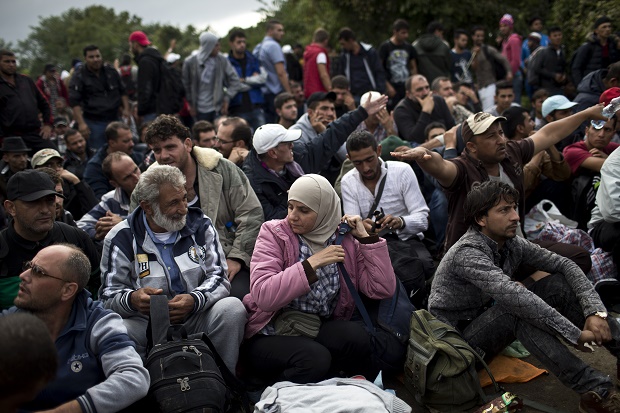
People wait to clear a police line as they entered into Croatia from Serbia, in Babska, Croatia, Friday, Sept. 25, 2015. Croatia lifted its blockade of the border with Serbia on Friday, as southeastern Europes squabbling governments took steps to ease tensions that had been rising in the region because of the surge of asylum seekers seeking refuge in the rest of Europe. AP Photo
ZAGREB, Croatia—Croatia and Serbia moved to ease tensions along their shared border on Friday after the EU’s powerful executive intervened in a bitter row sparked by Europe’s biggest postwar influx of refugee.
READ: Croatia closes border crossings with Serbia over migrants
Over the past week, the two neighbors have been locked in their worst spat since the 1990s Yugoslavian conflict, imposing tit-for-tat border restrictions over the human exodus seeking passage through the Balkans to northern Europe.
But on Friday, both sides moved to ease the dispute, lifting restrictions along their shared border which had triggered an escalating war of words.
Over the past 10 days since Hungary sealed its southern border with Serbia, nearly 60,000 refugees and migrants have crossed into Croatia, seeking an alternative route towards western Europe.
Overwhelmed by the sheer numbers, Zagreb closed all but one of its border crossings with Serbia, blaming Belgrade for diverting the flow towards their shared frontier.
READ: Croatia buses out migrants as Europe tensions mount
This week, Belgrade responded by closing the main Bajakovo-Batrovci crossing—the last one still open—to all trucks with Croatian plates, while Croatia closed the crossing to trucks and cars with Serbian plates.
Belgrade compared the restrictions to those taken during “the (Nazi) fascist regime in Croatia” during World War II.
In Brussels, the European Commission said it was “urgently seeking clarifications” from Croatia, while EU foreign policy chief Federica Mogherini phoned both Serbia and Croatia’s leaders.
The intervention appeared to work, with Croatia’s interior minister lifting the restrictions at 1500 GMT and Serbia following suit several hours later.
“Reason has won out,” said Serbian Prime Minister Aleksandar Vucic in a statement announcing that all restrictions had been lifted.
Wet and cold
As the weather turned wet and cold, people were still trying to travel westwards, with around 600 migrants arriving at the Beremend crossing between Croatia and Hungary, an AFP correspondent said.
“Last night was tough. It was raining so much. I was cold,” said 20-year-old Bashir Ahmad from Afghanistan.
“I hope I can make it to a good place to start a new life far from war, the Taliban,” he told AFP.
“Everything is bad on this journey, nothing is good. Everyone is exhausted,” said a 30-year-old Syrian who is hoping to join his family in Amsterdam.
“Yesterday was a very bad day, particularly because of the weather.”
Zagreb is bussing most of the new arrivals straight to the border with Hungary which Budapest has promised to seal.
“The influx of migrants is not going to abate,” Prime Minister Viktor Orban told reporters in Vienna.
“We want to stop people crossing.”
After closing off its southern border with Serbia, Hungary set up razor-wire fencing along 41 kilometers (25 miles) of its border with Croatia. The remaining 330 km (205 mi) runs roughly along the Drava river, which is difficult to cross.
Budapest on Thursday began rolling out a mobile barrier along its border with Slovenia—the first such measure within the EU’s treasured passport-free Schengen zone.
‘Lost humanity’
The influx of refugees has raised tensions not only between Balkan countries but has exposed deep fault lines between western and former communist eastern countries in the 28-nation bloc.
There have been growing fears that the Schengen zone could buckle as states reintroduce border checks to stem a flow of migrants, many of whom are heading for Germany.
As the diplomatic wrangling over the fate of the refugees continued, teenage Nobel laureate Malala Yousafzai said the world had lost its “humanity” over the crisis.
“We lost humanity on that day when… nowhere a child is welcomed,” she told reporters at the United Nations, explaining how pictures of a drowned Syrian toddler had haunted her.
Her remarks came as the International Organization for Migration said 2,873 people had died or gone missing while trying to reach European shores by boat.
“It is important that people open their hearts and … their lands to people who are now needing more support and who need the right to live,” she said.
On Wednesday, EU leaders agreed to boost aid for Syria’s neighbours who are hosting millions of refugees, while also strengthening the bloc’s outer frontiers and creating “hotspot” reception centers to sort real refugees from economic migrants.